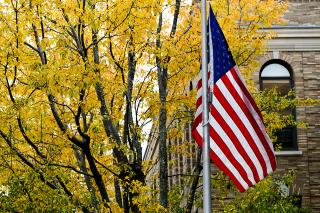With Election Day fast approaching, we spoke with Assistant Professor of Political Science and International Relations, Aaron Rosenthal, about what to expect on November 3rd and beyond as we await the outcome of the election.
When should we know the results of the election?
It is correct to assume that we will not know the outcome of the election on election night. A number of states do not start to open, or even process, their mail-in ballots until Election Day (see this list of when states start processing and counting mail-in ballots), so the increased numbers of mail-in ballots means that many states are unlikely to know their vote counts until after election night. In addition, several states — including Massachusetts — will accept ballots that arrive after Election Day, so long as they are postmarked by Election Day. That will add further delays to state counts.
Due to all of these complicating factors, there really is no way to accurately answer the question of when we will know the election results. Much of when we know will depend on how close the election turns out to be. The closer the two candidates are, the longer it is likely to take. We know that the electoral college is supposed to convene on December 14th to vote, so that is the date that we should absolutely expect an answer, and hopefully much sooner than that.
Is this the first time a decision won't be declared on Election Day? If not, what happened in those instances?
It is certainly not the first time, though the question of what happens next is also not an easy one to answer. If we go back to the election of 1800, we saw a tie in the electoral college, meaning that the election was later decided by the House of Representatives — as laid out in the Constitution.
More recently, the 2000 election saw Al Gore first declared the winner on election night, only for that call to be later reversed, and victory was given to George W. Bush. The actual conclusion of that election came on December 12th when the Supreme Court stopped a manual recount of Florida votes, giving Bush the victory.
Could a legal challenge from the losing candidate hold up the inauguration?
This is a particularly difficult question to answer because there is no historical precedent for it. The closest thing that we have is the 2000 election, where the Supreme Court decided against a more extensive recount in Florida in order to make sure that the results were certified prior to the electoral college vote. That precedent tells us that there is a lot of pressure on our institutions to ensure a winner before the electoral college vote takes place, which is on December 14th this year.
Notably, legal challenges to the election are likely this year, and there is concern over disproportionate ways in which ballots are rejected. A recent New York Times investigation showed how ballot rejections are already disproportionately impacting Black and Latinx voters, as well as young voters and first-time mail-in ballot voters. This trend reflects a much broader concern about voter suppression among these same populations, which is an important aspect of understanding this election.
What if President Donald Trump refuses to accept the election results?
There are many ways to answer this question, but I think the most straightforward one is that the president cannot decide who won the election. The electorate ultimately makes that decision, and we need to remember this fact. It is only when people submit to the idea that the president has the power to unilaterally decide the winner of the election that the people's power is lost. We should remember not to give in to that temptation.
Do you have any advice for the Simmons community while we await the results of the election?
Try your best to exercise patience and don’t expect to go to sleep on election night knowing who won (if you’re able to sleep that night). I would also recommend verifying any information you see with multiple sources. There are likely to be some wild rumors flying around on election night, so make sure to really check any information you come across before accepting it as truth. One source I can certainly recommend is the Simmons Political Science and International Relations Twitter account: @IrSimmons. Professors from the Department will be live-tweeting throughout election night, so be sure to check-in there.
Most importantly, make sure you go vote!

